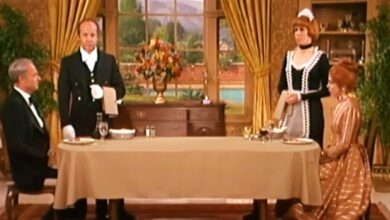Scotty McCreery Honors Country Music’s Legacy with a Soulful Tribute to Conway Twitty at the Grand Ole Opry
In the annals of country music, few songs resonate as deeply as Conway Twitty’s “Hello Darlin’.” Released in March 1970, this poignant ballad quickly ascended to the pinnacle of the Billboard Hot Country Singles chart, where it remained for four consecutive weeks. The song’s enduring appeal solidified its status as Twitty’s signature tune, captivating audiences with its heartfelt narrative of lost love and regret.
The origins of “Hello Darlin'” trace back to 1960, a full decade before its release. During his rock ‘n’ roll phase, Twitty penned the song but set it aside as he transitioned into country music. In 1969, while finalizing his ninth country album, he revisited the composition. Initially, Twitty sang the opening line, but it lacked the desired impact. Producer Owen Bradley suggested he speak the iconic words, “Hello darlin’, nice to see you,” a decision that added a profound sincerity to the track.
The song’s narrative is both simple and profound. It tells the story of a man who encounters a former lover and, despite his attempts to appear unaffected, reveals his lingering feelings and remorse. The raw emotion conveyed through Twitty’s delivery struck a chord with listeners, making it a staple in his concerts and a timeless classic in the country music repertoire.
Fast forward to the present day, and the legacy of “Hello Darlin'” continues to inspire artists across generations. One such artist is Scotty McCreery, who first captured the nation’s attention by winning the tenth season of “American Idol” in 2011 at the age of 17. With his deep baritone voice and genuine Southern charm, McCreery has often been compared to country legends, and his admiration for Twitty is evident in his performances.
In a memorable appearance at the Grand Ole Opry, McCreery paid homage to Twitty by delivering a heartfelt rendition of “Hello Darlin’.” Standing on the revered stage, he channeled the emotion and depth of the original, while infusing it with his unique vocal style. The audience was captivated, witnessing a seamless blend of past and present, as McCreery honored the timeless classic.
McCreery’s journey from a small-town boy in Garner, North Carolina, to a country music star is a testament to his dedication and passion for the genre. His debut album, “Clear as Day,” released in October 2011, debuted at number one on the Billboard Top 200 Albums chart, making him the first country artist and the youngest male artist of any genre to achieve this feat with a debut release. The album was certified platinum, further cementing his place in the country music scene.
Over the years, McCreery has continued to evolve as an artist, releasing multiple albums and chart-topping singles. His deep respect for country music’s roots is evident in his choice of songs and performances. By covering classics like “Hello Darlin’,” he bridges the gap between traditional country and contemporary audiences, ensuring that the rich history of the genre remains alive and relevant.
The impact of “Hello Darlin'” on the music industry is undeniable. Its success in 1970 not only bolstered Twitty’s career but also showcased the power of storytelling in music. The song’s universal themes of love, loss, and regret resonated with a wide audience, transcending the boundaries of country music and influencing artists across various genres.
Chart-wise, “Hello Darlin'” was a monumental success. It was named the number one song of 1970 and became a standard in country music. Its popularity extended beyond the United States, reaching international audiences and solidifying Twitty’s global appeal. The song’s enduring legacy is a testament to its timeless quality and the emotional depth it conveys.
Over the decades, “Hello Darlin'” has been covered by numerous artists, each bringing their unique interpretation to the classic. From Loretta Lynn to George Jones, the song’s influence is evident in its widespread adoption and the reverence with which it is treated by fellow musicians. McCreery’s rendition at the Grand Ole Opry is a continuation of this tradition, highlighting the song’s lasting impact on new generations of artists.
The Grand Ole Opry, often referred to as the “home of American music,” has been a cornerstone of country music since its inception. Performing “Hello Darlin'” on this iconic stage is a rite of passage for many country artists, symbolizing a deep connection to the genre’s history. McCreery’s performance not only paid tribute to Twitty but also underscored his own place within the lineage of country music.
In today’s rapidly changing music landscape, songs like “Hello Darlin'” serve as touchstones, reminding both artists and audiences of the genre’s rich heritage. McCreery’s decision to perform this classic is indicative of his commitment to honoring the past while forging his own path in the industry. It’s a delicate balance, but one that he manages with grace and authenticity.
As country music continues to evolve, the influence of pioneers like Conway Twitty remains ever-present. Their contributions have paved the way for contemporary artists, providing a foundation upon which new stories and songs are built. McCreery’s homage to “Hello Darlin'” is a poignant reminder of the enduring power of music to connect, inspire, and transcend time.
In conclusion, Scotty McCreery’s rendition of “Hello Darlin'” at the Grand Ole Opry is more than just a performance; it’s a bridge between eras, a salute to the legends who have shaped country music, and a testament to the timeless nature of heartfelt storytelling. As long as artists like McCreery continue to honor these classics, the legacy of songs like “Hello Darlin'” will undoubtedly endure for generations to come.



